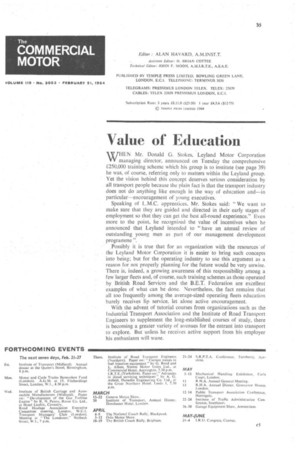Value of Education
Page 37

If you've noticed an error in this article please click here to report it so we can fix it.
WHEN Mr. Donald G. Stokes, Leyland Motor Corporation managing director, announced on Tuesday the comprehensive £250,000 training scheme which his group is to institute (see page 39) he was, of course, referring only to matters within the Leyland group. Yet the vision behind this concept deserves serious consideration by all transport people because the plain fact is that the transport industry does not do anything like enough in the way of education and—in particular—encouragement of young executives.
Speaking of L.M.C. apprentices, Mr. Stokes said: "We want to make sure that they are guided and directed in their early stages of employment so that they can get the best all-round experience." Even more to the point, he recognized the value of incentives when he announced that Leyland intended to "have an annual review of outstanding young men as part of our management development programme ".
Possibly it is true that for an organization with the resources of the Leyland Motor Corporation it is easier to bring such concepts into being; but for the operating industry to use this argument as a reason for not properly planning for the future would be very unwise. There is, indeed, a growing awareness of this responsibility among a few larger fleets and, of course, such training schemes as those operated by British Road Services and the B.E.T. Federation are excellent examples of what can be done. Nevertheless, the fact remains that all too frequently among the average-sized operating fleets education barely receives lip service, let alone active encouragement.
With the advent of tutorial courses from organizations such as the Industrial Transport Association and the Institute of Road Transport Engineers to supplement the long-established courses of study, there is becoming a greater variety of avenues for the entrant into transport to explore. But unless he receives active support from his employer his enthusiasm will wane.
























































































































